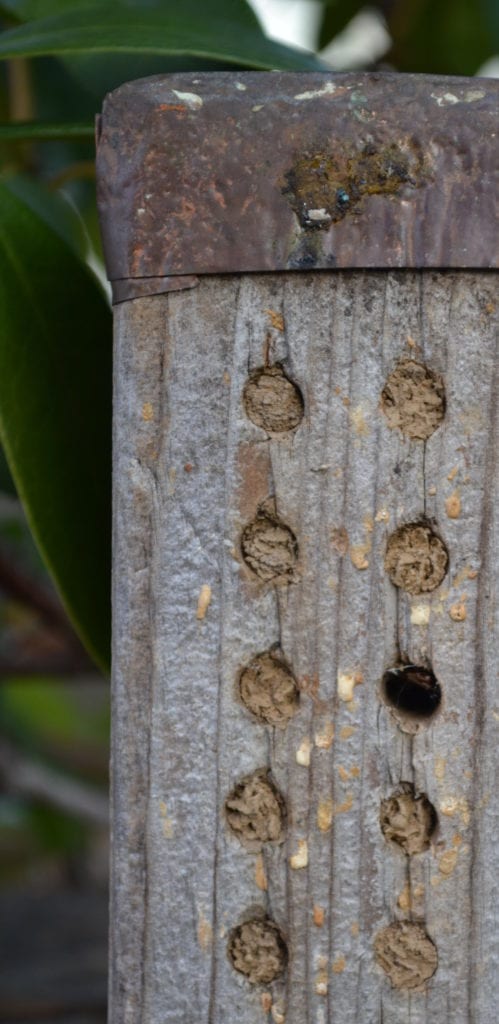The mason bees filled most of the tubes in the house this spring and the ends were sealed with the mud. Now in August, the mud seal is gone and the tubes are empty. I know it is too early for the young bees to emerge. Would a predator be responsible for raiding these tubes and destroying the egg cells? I doubt a bird could reach deep into the 6″ tubes, but perhaps wasps or other insects could be the problem. What should be done for next year’s bees?
 August would not be the right time for mason bees to emerge from their nests (not until next spring), but there are other insects that use mud to seal off their nests, certain types of wasp, for example. I would guess that it would be one of those species that has a shorter life cycle than the mason bee. Or it is quite possible that some predator found a way in to gobble up the baby bees.
August would not be the right time for mason bees to emerge from their nests (not until next spring), but there are other insects that use mud to seal off their nests, certain types of wasp, for example. I would guess that it would be one of those species that has a shorter life cycle than the mason bee. Or it is quite possible that some predator found a way in to gobble up the baby bees.
Ellen Sousa, Turkey Hill Brook Farm, Spencer, MA
My first thought would be a bird pecked at the ends. The males are gone and females probably safe. You could put a little depth gauge in each to see if there are still females in the end. To prevent a recurrence next year, sign up for Bee-Mail (Crown Bees newsletter tailored to geographic region). We would have reminded you to take the filled holes from the outdoor environment, put them into a BeeGuardian bag, and safely store them in ambient temps until fall.
Dave Hunter, Crown Bees, Woodinville, WA
Remember, the female lays eggs so that the males eggs are near the front of the tube (they come out first in the spring) and the females are toward the back of the tube. I always take my nests down after all the mud tubes are filled up and store them in my garage or basement. The only thing to be careful of is to make sure that in the spring, you don’t let the nests warm up while still in the garage/basement (or else the bees will start hatching in your basement/garage. This happened to me last year!
For more information about mason bees, refer to my article in the ELA Newsletter, Attract Mason Bees – No Protective Gear Needed.
Judy Beaudette, Seattle, WA
ELA members have spent hundreds of hours learning the best ecological solutions to problems in the landscape. You can benefit from all that accumulated knowledge by posing a question to our experts. If you are stumped by a problem in your landscape or are looking for a second opinion on a potential solution, ask ELA’s Eco-Pros. Send your question to ela.info@comcast.net. And if you need additional help, refer to the listing of ELA Professionals.
***
Each author appearing herein retains original copyright. Right to reproduce or disseminate all material herein, including to Columbia University Library’s CAUSEWAY Project, is otherwise reserved by ELA. Please contact ELA for permission to reprint.
Mention of products is not intended to constitute endorsement. Opinions expressed in this newsletter article do not necessarily represent those of ELA’s directors, staff, or members.

